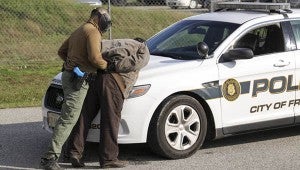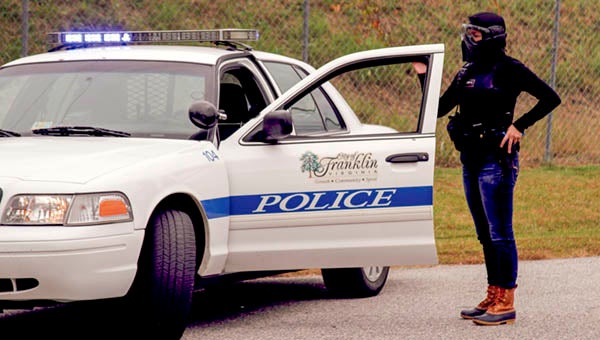Behind the badge: Part III
Published 10:25 am Friday, November 20, 2015
Editor’s Note: This is the third article in a series of stories intended to give readers an exclusive inside look at the professional lives of Franklin police officers.
FRANKLIN
Recently, I participated in a ride-along with members of the Franklin Police Department during the day.
On the morning of Wednesday, Nov. 3, I rode with Officer Kevin Muse. His first order of business was to go to Franklin High School and get information on a student that he had an encounter with over the weekend. Because the student is a minor, he needed to find contact information for the student’s parents.
Later, when we were patrolling the streets, he noticed that a vacant house was missing a board over a window. He was not able to find any evidence of a break-in at this house, so he put in a note in the file system for the department to keep an eye on it.
In the afternoon, I rode with Officer Quentin Livingston. During our drive, a situation arose when a person was speeding and was pulled over. For safety reasons, it was decided I would not get out of the car and walk up to the vehicle with Livingston. Police officers never know what they are walking into and they never know how situations are going to play out.
However, I was able to hear and see the interaction between the man and the officer.
The man explained that he didn’t realize how fast he was going and that he was sorry. He also gave his license and registration to Livingston automatically. The officer ran his information and was able to see that he had a clean driving record, so he let him go with a warning.
Livingston also received a call about a possible break-in. Upon arriving to the scene, he called for backup. After the other officer arrived, they searched the house, while I remained in the car until they cleared the scene.
Livingston then called the owner of the house, who happened to be out of town. He took fingerprints from around the window that appeared to be the entrance for the break-in. When done, he took the evidence back to the department to be processed.
The officers said this was a typical Wednesday day shift for them.

Members of the Franklin Police Department demonstrating how they would get a non-compliant suspect to comply, so they are able to put them under arrest. — SUBMITTED |SGT. BRENT GAYLE
Although we did not encounter any serious crimes, which typically happen during the night shift according to the officers, they did talk about certain situations when suspects don’t comply. Many of them referred to domestic violence calls.
Cpl. Josh Butts gave an example: “You come to work and you’re immediately in the middle of a domestic, which is one of the hottest and most emotional calls that you can get and they’re angry. That’s where you’re going to get the berating. One minute they can be arguing with each other and the next, as soon as you go to put handcuffs on who’s the predominant aggressor, the other one wants you to take the handcuffs off because that may be the breadwinner for the family and they realize now they’re going to jail, and now they’re coming at you.”
Throughout the ride-along, I was also able to see how some of the local community members feel about police officers just by the look on their faces.
The officers would drive around and patrol the streets and during this time, some of the community members were standing on the streets, the sidewalks or in their yards. Some of them would look at the officers as if they had no right to be patrolling the streets and some gave worse looks than that.
Even some of the kids we saw getting on and off of the school bus gave the police officers unfriendly looks, regardless of the fact that the officers waved at almost every child we passed.
Officer Muse mentioned that he also hates when parents tell their children that they should fear or dislike police officers. Many of them feel that when children grow up fearing the police, this leads to many of them hating police officers. This then could lead to many of them being non-compliant if or when they have an encounter with the officers.
Knowing how some of the public perceives the police, as well as all of the crimes and events that happen in this profession, affects the officers personally. It influences the simple things of life, the things that most people do during their day and don’t even think twice about it.
“You get on the brink of becoming cynical and jaded,” Sgt. Todd Lyons said. “When I go out to a restaurant I sit with my back against the wall. I don’t leave my house without a gun, anywhere. I’ve had to brief my wife to tell her that if I tell you to leave me, don’t ask me any questions just take the kids and get away from me as quickly as possible. That’s the way I have to live my life. The reason being is because now I am no longer naïve to the evils of humanity. I am well aware of what people are capable of. I am well aware of how evil humanity actually is and I will never ever be able to leave my house without a care in the world and just go see a movie.”
Cpl. Chris Thomas said, “We know what evil is. We’ve seen evil.”
Capt. Tim Whitt of the Franklin Police Department added, “The thing about evil is it looks like you and me. There’s no mask, there’s no writing on the shirt that says, ‘I’m the evil one.’ It looks like anyone.”
Butts said, “You’ll have a conversation with someone and they’ll ask you what do you think about this person and you’ll look at them and go, ‘Something don’t strike me right.’ A wise man when I worked in Suffolk once told me, ‘Your gut may not always be right, but it’s never wrong.’ And this job will make you believe and understand that and if you don’t, this job will take your life.”
The job also affects the police officers’ families. For some, I learned that without their families they wouldn’t make it through their job. Their faith and their families are what keep them grounded and keep them going every day.
“I am blessed, personally. In my home, I am blessed. When I met my wife, I was a police officer – and I think she knew about 25 percent of what she was getting into,” Lyons said. “But the good news is my wife enjoys her personal time, as well. We work Christmases, birthdays, holidays – and parents and grandparents and brothers and sisters, they miss you on birthdays and holidays but, the good news, is they understand what you’re doing and why you’re doing it.”
Thomas added, “Your kids understand you may not come home. My daughter, she’s 11 years old and she understands that daddy or momma may not come home. That carries a lot of weight on her. She’s talked to me about it and my son, too.”
Butts said, “I’m blessed with a wife who understands. In the last year, my faith has kept me in this profession. There have been times when I’ve looked at it and been like it’s time to go. But I honestly believe God has kept me here for a reason, to make an impact and for a purpose. My faith in Christ has kept me where I am at right now. That’s what controls my household and my relationship with my wife and my ability to stay in this job and not fear not coming home. Because my wife knows that if I don’t, I’m in a better place and she’s going to be okay and we’re going to get through it. It has a profound impact on everybody’s family.”
There are some officers who understand what the spouse goes through because not only are they in law enforcement, their spouses are too.
“I can speak from a different perspective because I have a wife who is in law enforcement. When she is at work and she doesn’t call, I get nervous. So I understand what the wives go through. It’s nothing easy to think your spouse may not come home. It’s pretty hard. They’re strong women. They’re very strong women,” Thomas said.
Some spouses and family members can never adapt to the life and fear of having a loved one in law enforcement.
“I’ve seen a lot of cops go through divorces. And nothing against those women personally, but in a vast majority of cases one of those key indicators was that the wives struggled with the idea of not having husband home and husband maybe not be coming home. People in most professions get hours, days, months to make a decision, we get seconds. We get nanoseconds, sometimes, to make a decision. Those decisions have to count because people’s lives are at stake,” Lyons said.
Butts added, “There are women in law enforcement who have the same fight and the same battles and it’s a balancing act every day to take the stresses of this job and manage the stresses of home and somewhere in the middle find an equilibrium that works. Each and every one of us [members of the Franklin Police Department] are Christians and I believe whole-heartedly that our faith is where we find that equal ground to keep us there.”
Lyons said, “I was going to say some days are better than others, but I’m going to rephrase that and say, some days are worse than others.”
Some officers themselves can’t handle the profession and the life it comes with.
Thomas said, “From 2008 to 2012, there were over 400 suicides in police officers. As police officers we take on so much and we go home, and some of these police officers can’t deal with it. We have our wives at home, they’re our support and we all have an out on how we have to go home and decompress.”
Butts said, “In this job, you try to look for it. You look for the guys, as we come into work and as we pass each other, who may be struggling a little bit more that day. You make sure you stay close to them. You make sure you stay in contact with them. If they’ve had to go through those events that they’ve had, if they’ve had a recent traumatic event, it could be something as simple as a traffic accident that resulted in a fatality that just hit them in the wrong way. We learn to watch out for those guys. We learn to watch out for each other. We try and find ways that we can get together and just talk. People go ‘You know all your friends are cops,’ well, they understand me.”
All the officers said that even though this profession comes with a lot, and sometimes affects them in negative ways, they stay in for the day when they get to save a life or for the one person who turns their life around because of them. They stay in it to make the community a better place. They want to protect the public, but they also said the public has to let them.
The final article in this series will be in this weekend’s edition. In it, you will get to read exactly what message members of the Franklin Police Department want to give to the public.






